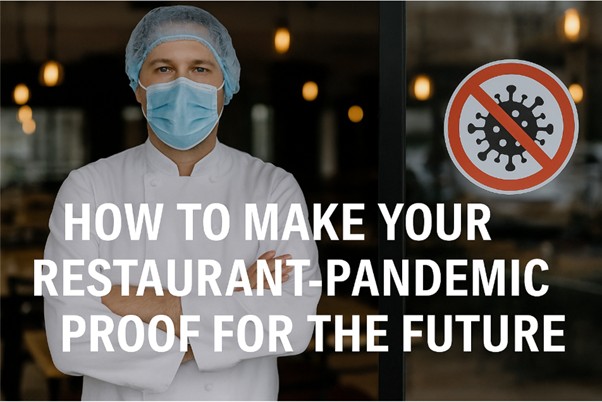
How to Make Your Restaurant Pandemic-Proof for the Future
The COVID-19 pandemic exposed just how vulnerable restaurants are to global disruptions. Overnight, footfall stopped, dining rooms closed, and customer expectations changed. While many restaurants scrambled to adapt, others saw the crisis as a catalyst to build resilience—and they’re thriving today.
The question now is not if there will be another disruption but when. So how can restaurants prepare today for an uncertain tomorrow?
Chef Shajahan M Abdul, founder of Restro Consultants Pvt Ltd (RCPL), says, “Pandemic-proofing a restaurant means future-proofing your business. It’s about agility, smart systems, and building for survival—not just success.”
Here’s how to ensure your
restaurant can withstand future disruptions while staying profitable and
relevant.
1. Embrace a Hybrid Model
One of the most powerful
lessons from the pandemic was that restaurants can’t rely solely on dine-in
traffic. Customers want flexibility, and offering both physical and virtual
experiences is key.
Hybrid models include:
Chef Abdul recommends
integrating at least two additional revenue streams to support your core
business. “A strong restaurant can cook for a table and a tablet simultaneously,”
he says.
RCPL has helped dozens of
restaurants build hybrid ecosystems that perform in standard and crisis
conditions.
2. Build a Contactless
Ecosystem
Contactless dining, ordering,
and payment systems are no longer optional—they’re expected. Touchless menus,
digital payments, QR-based ordering, and automated billing protect guests and
staff while improving efficiency.
Chef Shajahan M Abdul explains,
“Contactless isn’t just about health—it’s about control. Customers want to
manage their experience from their smartphones.”
Restro Consultants Pvt Ltd
(RCPL) specializes in implementing innovative POS systems, self-order kiosks,
and app integrations that make the restaurant more adaptable to sudden safety
protocols.
3. Diversify Your Supply Chain
Pandemic disruptions also
exposed how fragile global supply chains can be. Many restaurants were left
without key ingredients or stuck with unfulfilled orders.
The solution? Diversify and localise.
Restaurant consultants at RCPL
assist restaurants in creating supplier backups and flexible menu strategies
that work with available inventory. Chef Abdul notes, “A good chef can do
wonders with what’s available, but a great business ensures availability
first.”
4. Go Digital with Marketing
and Community Building
Restaurants with strong online
communities survived the pandemic better. Having loyal customers online means communicating
instantly, selling directly, and building trust—crucial during lockdowns and
uncertainty.
Key digital strategies include:
Chef Abdul emphasises the
importance of transparency: “Show your customers the kitchen, the chef, the
story. People support brands they feel connected to.”
RCPL helps brands craft
compelling digital content that markets and builds lasting relationships.
5. Redesign for Flexibility and
Safety
Restaurant layouts that allow
quick reconfiguration—such as spacing tables apart or shifting to outdoor
service—are far more pandemic-proof. Ventilation, air purifiers, and sanitation
stations are now part of permanent design planning.
Chef Shajahan M Abdul
recommends “modular thinking”: design spaces and workflows that can scale up or
down quickly, depending on the situation.
Restro Consultants Pvt Ltd
(RCPL) also assists in designing multi-purpose spaces that double as prep
zones, delivery hubs, or event areas.
6. Train Your Team for
Adaptability
Staff are your greatest
asset—but only if they’re equipped for evolving roles. During the pandemic,
many employees had to pivot from servers to delivery coordinators, social media
assistants, or packaging pros.
Chef Abdul advises,
“Cross-training is essential. A flexible team is the foundation of a
pandemic-proof operation.”
Restaurant consultants at RCPL
provide training modules that prepare staff for roles beyond traditional
service, including tech, hygiene compliance, and remote customer engagement.
7. Create Crisis SOPs and
Emergency Protocols
Most restaurants had no
playbook when the pandemic hit. In the future, every restaurant should have:
Chef Shajahan M Abdul believes
this is a core part of business continuity. “Hope is not a strategy. You need
protocols in place before the storm hits.”
RCPL offers customized SOP
development services to prepare restaurants for health crises, economic
disruptions, and staff shortages.
8. Invest in Technology and
Analytics
The modern restaurant’s toolkit
includes cloud-based systems, innovative inventory tools, AI-powered ordering,
and customer feedback analysis.
Chef Abdul states, “Data isn’t
just numbers—it’s foresight. Knowing what sells, when, and to whom helps you
respond faster during a crisis.”
Restro Consultants Pvt Ltd
(RCPL) supports restaurants in integrating real-time analytics and inventory
automation, ensuring operational clarity at all times.
Success Stories: Restaurants
That Pivoted and Prospered
These are just a few examples
of how future-focused strategies helped restaurants turn adversity into
opportunity.
Final Thoughts from Chef
Shajahan M Abdul
The restaurant of the future is
resilient, flexible, and digitally enabled. It’s built on strong systems,
empowered teams, and a diversified model that can pivot quickly in any crisis.
As Chef Shajahan M Abdul puts it:
“You can’t predict the next pandemic—but you can prepare. Pandemic-proofing
your restaurant isn’t a fear-based move—it’s a freedom-based one.”
With expert support from
restaurant consultants at Restro Consultants Pvt Ltd (RCPL), your restaurant
can confidently face the future—no matter what it brings.
Chef Abdul © Copyright 2024. All rights reserved.